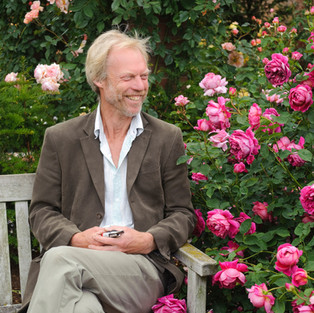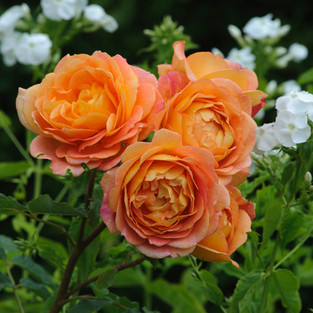THE COMFORT OF ROSES, with MICHAEL MARRIOTT, DAVID AUSTIN ROSES
- Jennifer Jewell
- May 7, 2020
- 6 min read

If April showers bring May flowers, for me those flowers must include my roses. They are in peak bloom from late April through through the month of May, and while they are not perfect - they will win no awards, we – by which I mean both me and my roses and us as humans and our collective roses – we have history. Deep and long, political and medicinal, medicinal, beautiful, and comforting.
As Michael Marriott indicates in this conversation, which he and I had in late February, "roses are perhaps the most beloved of all flowers" cultivated by humans over history. There are others of course – the orchid, the peony, the camellia, the chrysanthemum, but roses have long stood the test of time and when I think of my garden, native and habitat oriented, it will never be without the comfort of roses.
Michael Marriott is technical manager and senior rosarian of David Austin Roses and among the world’s most respected rose experts. He is known for his rose garden design, and his common sense approach to looking after these sometimes seen to be fussy creatures. His own gardens have always been run on organic principles, and in them he selects only the healthiest varieties of roses and generously intermixes other plants to increase the healthy biodiversity in all layers of the garden - from soil life to insect and pollinator life..
At David Austin Roses for more than 35 years, Michael’s knowledge of roses is encyclopedic, and his love for them is expansive - especially the fragrant roses, the species roses, the old roses, the climbers and ramblers, and the best modern and English Roses.
"Roses are perhaps the most beloved of all flowers cultivated by humans over history...and as such, they can be a conduit for caring more in general about the nature of our world."
Michael Marriott,
Senior Rosarian, David Austin Roses
The esteemed plantsman David C.H. Austin, founder of David Austin Roses died in 2018 at the age of 92, having introduced more than 230 modern English roses. As the Romeo and Juliet quote goes, "A rose by any other name would smell as sweet,...” but with absolutely no disrespect to Shakespeare – would it, really? There’s plenty in a name. According to Michael Marriott, David Austin used to say that "the easiest way to kill a rose was to give it a bad name.” He was also a lover of fragrant roses and believed that: "a rose without fragrance is only half a rose."
As Michael notes, the man David Austin revolutionized how we think about roses over the course of his career from 1961, when he introduced his hybrid Constance Spry, to 1983 when his work to develop colorful, repeat blooming roses with the charm, habits and fragrances of old roses finally captured the imagination of the gardening public, to 2018 when he died.
A lot has changed in the world and in the world of rose growing since Michael first began at David Austin roses more than 35 years ago, but some things have not including the baseline ethos at David Austin Roses to breed and select for roses that are beautiful above all else. Because sometimes we want the comfort of the known, and well loved beauty even more than we want novelty.
Roses as a group are believed to be more than 35 million years old based on fossil evidence, and across the Northern Hemisphere there are some 150 distinct species. Based on records, the rose was cultivated by people beginning more than 5,000 years ago in China.
From its base in Albrighton, David Austin Roses sells English Roses in 30 countries through mail order and retail. His English Roses "are considered the benchmark for modern roses. His roses won him 24 gold medals at the prestigious Chelsea Flower Show in London and the Order of the British Empire in 2007 for services to horticulture."
Michael and I corresponded this last week, to follow up with me on how life at the garden and home has been since the shut down for he and Rosie.
" We are both very well and have kept very much to ourselves, which in fact has been a delight as the weather on the whole has been very good so giving lots of time to spend time in our garden and two allotments which are just up the road. The fact that the lockdown started in early spring was also very good giving the opportunity to really work in the garden at exactly the right time before the weeds got going.
The other exciting thing that’s happened in the last five weeks is that we’ve bought the other half of our house which hadn’t been lived in for over thirty years and the garden not gardened for the same length of time. To access some areas of the garden we had to tunnel through the undergrowth!"
Happy growing to us all!
Join us again next week when Cultivating Place, still feeling very rosy, continues our conversations on one of our most beloved garden plants – the ROSES – with roseologist and floral designer Fallon Shea, currently based in Southern California. She likes to think of herself as a Rose Devotee and as we know (and the roses intended) – she is not alone. Join us!
There are soooooo many ways people engage in and grow from the cultivation of their places.
RELATED EPISODES INCLUDE:
Thinking out Loud this week...
Ok So thinking out loud this week –
If you listened last week you may recall the idea of plants as landmarks in our lives – wayfinders and mile markers over time. Roses are so right here for me and I am not even sure why? IN my childhood garden at 8,000 feet along Colorado’s Front Range, my mother did not grow a lot of roses – she must have had some, but I don’t remember them strongly the way I remember her peonies, or Icelandic poppies. But later in life and especially in her final garden along a tidal marsh in South Carolina’s low country, she grew many roses, and throughout most of my life she wore Tea Rose perfume and this scent I remember with a warmth and happiness that closes my eyes and radiates up from my belly. It’s a safe, simple and satisfying memory that can reset me as needed. Like my garden does daily.
Mother’s Day is coming up – in all it hallmark superficiality and messy human complexity – I wrote a little about this in the View From Here viewsletter I sent out this last week – about the idea of motherhood, mothering and of course about the love and care for that mother to us all – mother earth. She is the original generous gardener, isn’t she?
May’s View from here – entitled Mothering the Future, can be found at CultivatingPlace.Com under the newsletter tab and if you’re not already subscribed to get it right to your email inbox once a month you can sign up for it right there.
When I first started my radio program in 2007 – the shorter, more localized Northern California version of Cultivating Place called In a North State Garden, it quickly became clear to me that there were some proudly defined sub-groups in horticulture – including the edible gardeners, the native plant gardeners, the cut flower gardeners and the rose gardeners - who have a particular ferocity in their knowledge and passion.
Modern day roses lovers have a long history behind them: according to the University of Illinois, roses were in such high demand in the 17th century that royalty considered roses or rose water a legal tender, and they were often used as barter and for payments.
I read this and thought that is the kind of economy that makes some sense to me – roses for rent, or food, or anything. I just can’t decide if I charge more or less for the aphids? And this year, I have a tiny green caterpillar snacking on the roses too – but the sparrows and house finches seem to be making snacks of them, so I am waiting to see how this particular garden drama unfolds. I will say the little green caterpillars are particularly disgusting from my human eye view…I'm really hoping you have no idea what I’m talking about…and as I said at the outset of the episode, I am willing to be patient and trust in my roses cause well - we have a long history together. And they are part of the larger whole.
Have questions about your roses (or their visitors?) They can likely be answered by your local rose society. If you are not sure where your closest group might be – head to the American Rose Society -www.rose.org OR the International Rose Society www.worldrose.org. Or of course, to DavidAustinRoses.com
WAYS TO SUPPORT CULTIVATING PLACE
SHARE the podcast with friends: If you enjoy these conversations about these things we love and which connect us, please share them forward with others. Thank you in advance!
RATE the podcast on iTunes: Or wherever you get your podcast feed: Please submit a ranking and a review of the program on Itunes! To do so follow this link: iTunes Review and Rate (once there, click View In Itunes and go to Ratings and Reviews)
DONATE: Cultivating Place is a listener-supported co-production of North State Public Radio. To make your tax-deductible listener contribution – please click the donate button below. Thank you in advance for your help making these valuable conversations grow.
Or, make checks payable to: North State Public Radio - Cultivating Place
with Cultivating Place in the memo line, too
mail to: California State University, Chico
400 W. First Street
Chico, CA 95929-0999
































































Financial services refer to a broad range of services provided by the finance industry, including banking, investment, insurance, and wealth management. These services are essential for individuals and businesses to manage their financial activities, protect assets, and grow wealth. To get personalized assistance, the best Rocket Money phone number can help resolve issues or provide guidance on managing finances effectively. With advancements in technology, financial services have become more accessible, offering digital platforms for investments, budgeting, and transactions. For those seeking personal finance management, tools like Rocket Money (formerly Truebill) provide easy ways to track expenses and subscriptions.